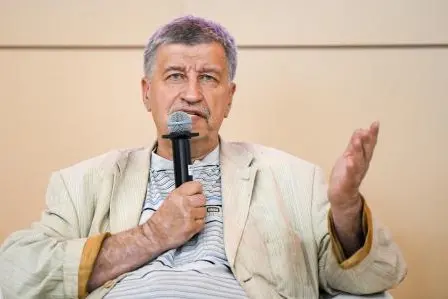PHOTO
Moscow: A panel discussion titled ‘Russian Orientalists and Arab History’, was organised as part of Sharjah’s activities as ‘Guest City’ at the Moscow International Book Fair 2019 (MIBF). Held at the Sharjah pavilion, the panelists included Dr Hamad Bin Saray, Associate Professor of Ancient History at the faculty of Humanities and Social Sciences, UAE University; and Dmitry Mikulski, researcher at the Institute of Oriental Studies of the Russian Academy of Sciences and moderated by poet Sheikha Al Mutairi.
The panelists focused on the Russian interest in Arabic culture, and the efforts to document the political atmosphere. Bin Saray highlighted several studies done by Russian Orientals who had documented the Arabic region accurately. He also noted the Russian interest in Arabs, pre- as well as post Islam.
For his part, Mikulski answered the question why Russian Orientals had been honest in their research on Arabs, by saying: ‘Many factors contributed to this, most notably that Russia did not have colonial ambitions in the Arab region, and that Russians saw Arabs as brothers against the Turks and the Ottoman Empire. Also, Russia before the end of the Tsar regimes had operated in an imperial manner, working on extending its reach through alliances far and wide.”
He noted that to date, Russian researchers were still discovering Arabic coins dating back to the Abbasid era in Russian territory. He said that the Abbasid currency had been in use globally during that era.
He pointed out that this relationship between Russia and the Arab world had not included scientific studies and research, which had come at a later stage, and noted that Russia had celebrated the 200th anniversary of Orientalism in 2018.
Mikulski added that before studies in Orientalism, the Russian-Arab relations had gone through many stages, most notably during the reign of Catherine the Great. He said that she had understood the importance of Islam and had formed an independent entity to manage Muslim affairs. She had enabled the construction of mosques and publishing a translated version of the Holy Quran. He said that during her reign, one of the most important publishing houses that produced Arabic content had been based in the city of Kazan.
-Ends-
© Press Release 2019Disclaimer: The contents of this press release was provided from an external third party provider. This website is not responsible for, and does not control, such external content. This content is provided on an “as is” and “as available” basis and has not been edited in any way. Neither this website nor our affiliates guarantee the accuracy of or endorse the views or opinions expressed in this press release.
The press release is provided for informational purposes only. The content does not provide tax, legal or investment advice or opinion regarding the suitability, value or profitability of any particular security, portfolio or investment strategy. Neither this website nor our affiliates shall be liable for any errors or inaccuracies in the content, or for any actions taken by you in reliance thereon. You expressly agree that your use of the information within this article is at your sole risk.
To the fullest extent permitted by applicable law, this website, its parent company, its subsidiaries, its affiliates and the respective shareholders, directors, officers, employees, agents, advertisers, content providers and licensors will not be liable (jointly or severally) to you for any direct, indirect, consequential, special, incidental, punitive or exemplary damages, including without limitation, lost profits, lost savings and lost revenues, whether in negligence, tort, contract or any other theory of liability, even if the parties have been advised of the possibility or could have foreseen any such damages.




















